FRSA held its annual National Conference at the Gold Coast Convention and Exhibition Centre, 15-18 May, on the beautiful lands of the people of the Yugambeh language region.
It is always a pleasure to bring the sector together to share research, practice learnings and insights and we were thrilled to have over 550 delegates join this year’s conference – a new record! Practitioners, academics and policy makers working to support children, families and communities came together to reflect on the question: what does it really mean to put services within everyone’s reach?
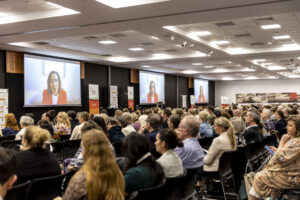 The week started with four well subscribed pre-Conference workshops:
The week started with four well subscribed pre-Conference workshops:
- Aboriginal & Torres Strait Islander Workshop – Dadirri: Ancient Aboriginal Mindfulness Traditions presented by We Al-li
- Communities for Children Facilitating Partner (CfC FP) Workshop
- Family Law Workshop
- Balancing reporting requirements and meaningful data collection. How to make data work for you and your funders facilitated by the Evidence and Evaluation Support team at the Australian Institute of Family Studies.
On Tuesday 16 May, we were honoured to have John Graham – a Traditional Custodian of the Gold Coast region, a Kombumerri man, a saltwater man of the Gold Coast part of the wider Yugambeh Language Group – provide a gracious Welcome to Country.
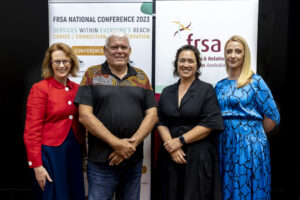 The Hon Amanda Rishworth MP, Minister for Social Services provided a live-streamed opening address. This was followed by a keynote address from Catherine Liddle, CEO, SNAICC – National Voice for our children. Catherine spoke persuasively to the topic Stronger ACCOs, Stronger Families -driving reform to Close the Gap for Aboriginal and Torres Strait Islander families.
The Hon Amanda Rishworth MP, Minister for Social Services provided a live-streamed opening address. This was followed by a keynote address from Catherine Liddle, CEO, SNAICC – National Voice for our children. Catherine spoke persuasively to the topic Stronger ACCOs, Stronger Families -driving reform to Close the Gap for Aboriginal and Torres Strait Islander families.
Our first panel discussion – The Early years: giving every child the best start in life– was chaired by the National Children’s Commissioner, Anne Hollonds and brought together experts from early education, health, government and child maltreatment research to respond to the question: what will it take to ensure that every child born in Australia has the opportunity to reach their full potential? Panellists included:
- Catherine Chamberlain, Director of Onemda Aboriginal and Torres Strait Islander Health and Wellbeing at the Melbourne School of Population and Global Health, The University of Melbourne
- Ben Mathews, Principal Research Fellow in the School of Law at Queensland University of Technology
- Annette Michaux, Member, National Coalition for Child Safety Steering Group
- Samantha Page, CEO, Early Childhood Australia
- Tarja Saastamoinen, Group Manager, Families, Department of Social Services.
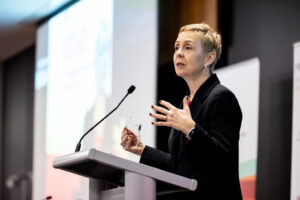 Day two of the Conference opened with another great plenary line-up. Attorney-General, the Hon Mark Dreyfuss KC MP provided a pre-recorded address, acknowledging the work of the family and relationship services sector and outlining recent government measures towards making the family law system safer and simpler for separating parents and their children.
Day two of the Conference opened with another great plenary line-up. Attorney-General, the Hon Mark Dreyfuss KC MP provided a pre-recorded address, acknowledging the work of the family and relationship services sector and outlining recent government measures towards making the family law system safer and simpler for separating parents and their children.
This was followed by a keynote address by Micaela Cronin, Australia’s first Domestic, Family and Sexual Violence Commissioner. Micaela grounded her presentation in her experiences as a social worker in family violence and sexual assault services and how these experiences have shaped her vision of the role of national leadership in ending violence against women and children.
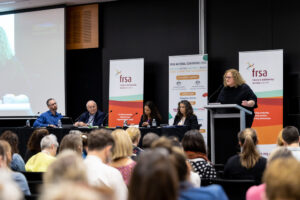 Panel discussion two – Upholding children’s rights in the family law system – brought together four panellists to respond to the questions: to what extent does the family law system uphold the rights of children and young people? How can we enable children and young people to participate in family law decisions meaningfully and safely? This rich discussion was chaired by Dr Rae Kaspiew, Australian Institute of Family Studies and the panel included:
Panel discussion two – Upholding children’s rights in the family law system – brought together four panellists to respond to the questions: to what extent does the family law system uphold the rights of children and young people? How can we enable children and young people to participate in family law decisions meaningfully and safely? This rich discussion was chaired by Dr Rae Kaspiew, Australian Institute of Family Studies and the panel included:
- Chris Collett – First Assistant Secretary, Family Law, Attorney-General’s Department
- Megan Solomon – Practice Lead Counselling, Uniting NSW
- Dr Georgina Dimopoulos – Socio-legal researcher, Southern Cross University
- The Hon John Faulks – Family Law Council.
The great richness and diversity of the sector was showcased each and every day in the concurrent session program. With over 65 presentations and five symposiums, we felt privileged to bring this part of the program to delegates, sourced from our network and related stakeholders. Slides from these presentations will be made available via the FRSA Conference page subject to author permission. Keynote presentations and the Panel Discussions will be uploaded to FRSA’s YouTube channel in the coming weeks.
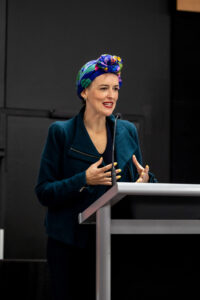 The Conference closed with an engaging, thought provoking and, at times, deeply sobering talk by Walkley-Award winning journalist and author, Jess Hill. Jess spoke to the issue of coercive control and, importantly, how a paradigm shift in the way we understand domestic violence and coercive control can enable a more effective response.
The Conference closed with an engaging, thought provoking and, at times, deeply sobering talk by Walkley-Award winning journalist and author, Jess Hill. Jess spoke to the issue of coercive control and, importantly, how a paradigm shift in the way we understand domestic violence and coercive control can enable a more effective response.
Gala dinner
The work our sector does is deeply rewarding but also hard. The Conference Gala Dinner provides an opportunity to come together, relax and celebrate all that the sector has achieved over the previous year.
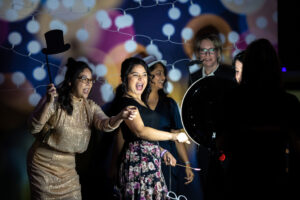 We were delighted to have the Yugambeh Aboriginal Dance Group perform at the dinner providing an insight into local First Nations culture by sharing ancient knowledge through traditional songs, stories, and dance.
We were delighted to have the Yugambeh Aboriginal Dance Group perform at the dinner providing an insight into local First Nations culture by sharing ancient knowledge through traditional songs, stories, and dance.
Local band, the Baker Boys Band kept people dancing till the reluctant close of the evening!





